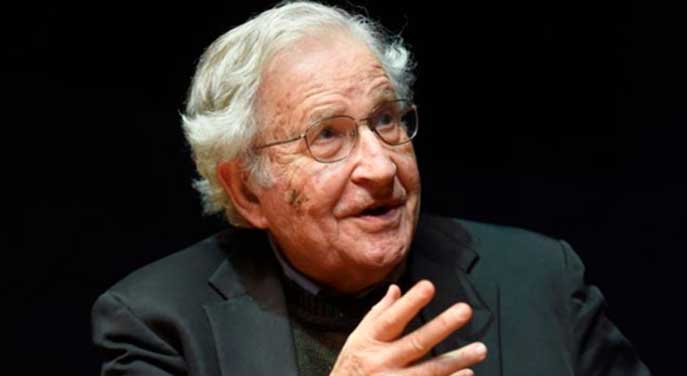 American intellectual and longtime social activist Noam Chomsky has been described by a term that’s deeply offensive: a self-hating Jew.
American intellectual and longtime social activist Noam Chomsky has been described by a term that’s deeply offensive: a self-hating Jew.
There’s nothing hateful about Chomsky. He’s a sojourner of truth and a voice of reason.
In a recent interview, Chomsky talked about the roots of his activism. He was brought up in an educated Jewish family in Philadelphia. His father was a Hebrew scholar and his parents believed in social activism. When studying scripture, they focused on the teachings of the prophets and the message to care for the widow and the orphan.
Chomsky noted that life didn’t always go well for those who challenged the powerful, pointing out that the great prophet Elijah was also called a hater of Israel.
Along with his environmental activism, his critique of the mainstream media and honest analysis of geopolitical hypocrisies, Chomsky has been an advocate of Palestinian rights for more than a half century. That seems to upset a great number of people.
As I’ve published articles about Palestinian rights, I too have seen pro-Israeli media watchdogs attack my writings.
Being a Christian who has deep respect for Jews, Jewish spirituality and heritage, I would never want to say anything anti-Semitic. I therefore contacted organizations that I knew shared my views, including Jewish Voice for Peace and Independent Jewish Voices. I found wonderful people who understand Hebrew scripture the same way Chomsky does. And I learned that they too are described as self-hating.
Studying the philosophies of these organizations and reflecting on my Catholic heritage, I came to realize that Christian activism and Jewish activism are fruits of the same vine. Jesus, after all, was a Jew, raised in the same tradition as Chomsky, American politician Bernie Sanders and the writers of the New Testament.
It should therefore be of little surprise that the two most progressive platforms in the American Democratic presidential primaries were those of Sanders and Marianne Williamson, two Jews whose parents taught them the importance of racial equality and social justice. It’s no irony that they also had the most respectful views toward Palestinians.
Later in his interview, Chomsky pointed out that Catholics who embraced what they called a “preferential option for the poor” during the Cold War were murdered by pro-American hit squads in Latin America and other places, while conservative Catholics and other Christians derided them as communists.
I saw this play out when I lived in the Philippines during the corrupt and pro-capitalist Marcos regime. Exceptional, kind, caring people were called communists. Worse, some of them were killed. Government-supported militias often targeted simple parish workers in an effort to keep the more outspoken members of the clergy quiet.
I won’t argue that communists also profess a desire to make life better for the poor, but their ideology is based on materialism. The people I knew were deeply spiritual and based their actions on a profound belief in a God of compassion.
So it’s as ludicrous to call a Jew who believes in the rights of Palestinians self-hating as it is to call a person who radically follows the message of Jesus a communist. The God of Hebrew Scripture is a God of justice who calls upon us to seek truth, to love our neighbours and to support those who are looked down on by the rest of society.
Life wasn’t easy for the prophets who challenged the kings of Israel. They were ridiculed and cast out of their communities, much like Chomsky and the hundreds of thousands of Jews who speak out for Palestinian rights all over the world today.
History will continue to repeat itself until we learn the lessons we need to learn.
Gerry Chidiac is an award-winning high school teacher specializing in languages, genocide studies and work with at-risk students.
For interview requests, click here. You must be a Troy Media Marketplace media subscriber to access our Sourcebook.
The views, opinions and positions expressed by columnists and contributors are the author’s alone. They do not inherently or expressly reflect the views, opinions and/or positions of our publication.


